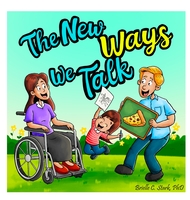The New Ways We Talk:
A Story about a Parent's Aphasia for Young Children
By Brielle C. Stark, PhD
When words get tangled, love finds a new voice. Meet Harriet, a lively girl whose world turns upside down when her mum has a stroke and develops aphasia, a language disorder that makes speaking and understanding words hard . Guided by a warm speech therapist and fueled by crayons, picture boards and endless imagination, Harriet and her family learn the new ways we talk-from pointing at pizza to finishing each other's words .
The New Ways We Talk is a heartfelt picture book that turns a complex medical reality into a hopeful celebration of family, resilience and alternative communication. Written by leading aphasia expert Dr Brielle C. Stark, it blends clinical accuracy with gentle, positive, hopeful storytelling, ensuring every page rings true for families, educators and therapists alike .
Why this book matters
One of very few mainstream children's stories about aphasia. More than 2 million Americans live with aphasia, yet kids' literature is almost silent on the topic.
Promotes inclusive communication. Kids see pictures, gestures and teamwork in action-perfect for classrooms exploring disability awareness, speech therapy and neurodiversity.
Empowers young caregivers. Harriet models empathy and practical strategies any child can try at home.
Back-of-book resources. A simple glossary and conversation tips give parents and professionals ready-to-use tools.
Perfect for
Families adjusting to stroke recovery or any language disorder
Speech-language pathologists and rehabilitation teams
Teachers building social-emotional learning or health education units
Libraries seeking fresh titles on diversity and inclusion
"Even when words are hard, love speaks loudest of all."
Share The New Ways We Talk with every child who needs to know that connection never depends on perfect speech-it just needs an open heart and a little creativity.
Thank you to the National Aphasia Association for featuring the book!
Ways to Purchase
Other purchasing options:
Purchase directly from Amazon (eBook available too!)
Purchase directly from Barnes & Noble
Purchase directly from Booktopia (Australia)
Purchase directly from Indigo (Canada)
I can do discounts for bulk (10+) purchases. Send me an email! bcstark[at]iu.edu
Book proceeds support the NEURAL Research Lab LLC Fund
Funds are held in a restricted account managed by NEURAL Research Lab LLC and used solely for:
Participant reimbursement in aphasia studies.
Mini-grants awarded annually to early-career researchers studying children and aphasia, particularly projects that leverage or evaluate this book.
Oversight & Transparency: Annual spending summary posted publicly here. (Publisher distributes compensation every November)
FY 2025 Final Numbers to the neural research lab llc (Nov 2025):
Want to donate to the fund? Click button below!
Interested in adapting the book?
The author would love to see translated and adapted versions of the book.
Pitch your idea.
Email bcstark [at] iu.edu with:
target language or format (e.g., Spanish, braille, audiobook)
key changes (new art, local examples)
intended audience and distribution plan
Agree to and sign the one-page license. There is an option to co-fund.
We send a short agreement covering attribution, accuracy, payments, and profit reinvestment.
Cost transparency:
ISBN via IngramSpark – $85
Typical new illustrations – ≈ $400
Need help? If our NEURAL Research Lab LLC has sufficient balance, you may apply for a 50% cost-share (we match your spend on ISBN and illustrations). Just include a brief budget in your email.
Interested in writing your own children’s book?
My book is simply one perspective. It’s a very positive perspective, and it’s from someone who doesn’t have aphasia. There are so, so many different experiences that should be shared with kids.
If you’re interested in writing your own book, without adapting or translating ours, I’d love to help then too! I’m open to consulting about self-publishing on IngramSpark and ways of commissioning art to suit your needs. Send me an email to chat!
About the Author
Dr. Brielle C. Stark is a professor in Bloomington, Indiana. She has personal and academic interests in aphasia. She manages the NEURAL Research Lab at Indiana University, hoping to improve understanding of aphasia, especially how speaking and the brain change after stroke. She loves spending time with her two young children and husband. She is often found refereeing rowing races around the country, riding her horse, hiking with her dog, or baking.










